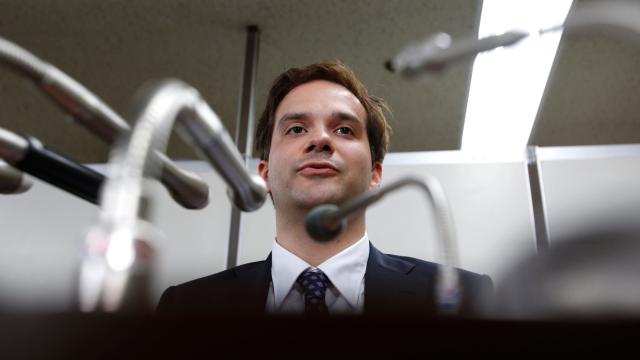Photo: AP
Mark Karpelès, the former chief of spectacularly failed Japanese Bitcoin exchange Mt. Gox, is on trial in Japan on charges he embezzled millions from the company before its collapse. He, Mt. Gox, and his current company Tibanne (which owns 88 per cent of Mt. Gox) are all bankrupt.
Yet Karpelès could still walk away with hundreds of millions in profits from his various business schemes, reported the Wall Street Journal this week, because over 200,000 bitcoins recovered after Mt. Gox declared bankruptcy in 2014 have risen dramatically in value.
As Ars Technica notes, when Mt. Gox claimed to have lost 750,000 bitcoins belonging to customers shortly before its collapse, those were worth around $US412.5 million ($538 million). Now the 200,000-plus bitcoins alone are worth $US1.3-$1.5 billion ($1.7-$2 billion) at the current going rate of $US6,500 ($8,484) per coin, but Karpelès is only obligated to reimburse customers at the 2014 rate.
Per the WSJ‘s calculations, “After accounting for smaller amounts of nonbitcoin assets and liabilities, Mt. Gox has a surplus on paper of ¥111 billion, or $US977 million ($1,275 million), that could go to its shareholders.” Karpelès could in theory walk away with hundreds of millions of that due to specifics of Japanese law that prevent customers from simply having the bitcoins returned.
However, all three bankruptcy proceedings will require determining that Mt. Gox, Tibanne and Karpelès do not have extensive undisclosed liabilities. Karpelès told the paper in an email that he expects to walk away with little benefit, as selling such a large quantity of coins would be difficult and bankruptcy assets often sell well below market rate.
“… All of Mt. Gox’s debts were frozen as of April 24th 2014,” Karpelès wrote in a separate email to Ars Technica. “Creditors, when filing with the bankruptcy, had to convert any amount to [yen] — which makes sense in a purely legal term, as it’d be impossible for anyone to proceed with a bankruptcy if debts had to be re-calculated all the time and could change over time.”
The price of Bitcoin has surged this year to a previously unthinkable preponderance of scams.
Yet even if Bitcoin crashed significantly, it would likely remain above the value in 2014. As Reuters noted, the crash of Mt. Gox was one of the primary incidents that spurred Japanese authorities to regulate cryptocurrency in 2017.
Karpelès maintains his innocence in the embezzlement case. A number of creditors have formed a group at https://www.mtgoxlegal.com, saying they are “coordinating legal action to stop the $US1,000,000,000 ($1,305,262,000) surplus going to the people responsible for the exchange when it was hacked, and instead have it shared among creditors who were victims of crime.”
